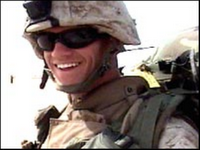 A Marine Corps corporal who fell on a grenade to save his fellow troopers has become the second soldier in the Iraq war to be awarded the Medal of Honor, the nation's highest military decoration.
A Marine Corps corporal who fell on a grenade to save his fellow troopers has become the second soldier in the Iraq war to be awarded the Medal of Honor, the nation's highest military decoration.In April 2004, Jason Dunham was leading a patrol near the Syrian border when it stopped a convoy of cars leaving the scene of an attack on a Marine convoy.
An occupant of one of the cars attacked Dunham and the two fought hand to hand. As they fought, Dunham yelled to fellow Marines, "No, no watch his hand."The Scio, New York, native had extended his enlistment so he could stay with his unit in Iraq. He was critically wounded in the explosion and died eight days later.
The attacker then dropped a grenade and Dunham hurled himself on top of it, using his helmet to try to blunt the force of the blast.
Dunham would have been 25 last Friday.
Army Sergeant 1st Class Paul Ray Smith was the other Medal of Honor winner in Iraq. He was honored for action near Baghdad International Airport in April 2003 in which he killed as many as 50 enemy combatants while helping wounded comrades to safety.
Smith was the only U.S. soldier killed in the battle.
More here.
WHY SO FEW MEDALS OF HONOR?
Some 300,000 Americans have served in Iraq, and there has been some criticism that the Medal of Honor had only been awarded once until the announcement that Jason Dunham would receive the medal.Here are the number of medal winners for major conflicts since the Civil War:
464 -- World War IIIt would appear that there indeed have been a disproportionately low number of Iraq receipients, and critics have gone so far as to say that the Pentagon has intentionally supressed the awarding of major medals since they often are given posthumously and it has not wanted additional attention drawn to an increasingly unpopular war.
245 -- Vietnam War
131 -- Korean War
124 -- World War I
110 -- Spanish-American War
That explanation is too simplistic.
A better explanation is that beyond the invasion in the spring of 2003, two major battles in Fallujah and a small number of other battles, there (thankfully) has been little opportunity for soldiers to be in the kind of extreme situations that Medal of Honor winners have experienced in other wars.
No comments:
Post a Comment